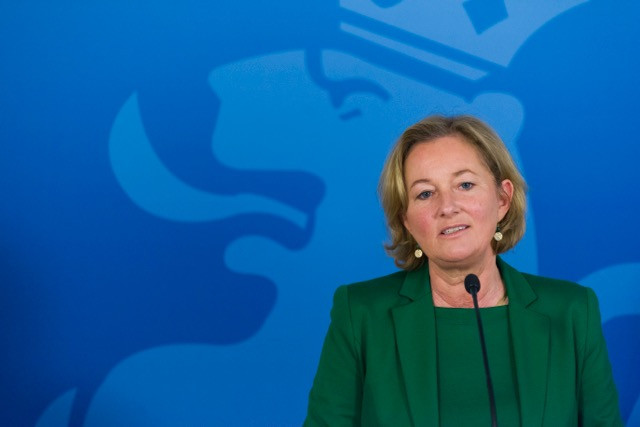The government on Tuesday afternoon finally revealed the names of those people advising its coronavirus strategy. As well as members of the research task force and its interministerial deconfinement working group, the government is relying on external advisors in an ad hoc strategy group and several consultants in the more specific cells working on crisis management, monitoring and logistics.
Whether this latest move will ease pressure on the government’s communications policy remains to be seen.
At the start of this crisis, we wrote that the media updates held by prime minister Xavier Bettel (DP) and health minister Paulette Lenert (LSAP) had been judged just right. They had shown serious professionalism and been sober and transparent when briefing on the coronavirus. The government, while arguably waiting too long to commit to universal confinement, had shown shrewd political acumen in ensuring public health was the priority. The swift setting up of advanced medical centres and the procurement of PPE and other vital equipment displayed foresight and a government that, as it has shown in the past, can be agile when required.
Action to help parents, employees and businesses had also been swift, if not universal. Labour minister Dan Kersch (LSAP) is the only cabinet member who has really slipped up. His suggestion that those with the broadest shoulders should bear more of the burden than others was a fine sentiment, it’s just that he appeared unable to acknowledge that many entrepreneurs who have personal debt tied up in businesses that are no longer operating or barely being keept afloat do not belong to the “broad shoulder” category. It was a misstep that belied the otherwise general sense of empathy ministers have shown for those affected by this crisis, be it physically, mentally or economically.
As The Washington Post pointed out on Sunday, of the total 13 hours that US president Donald Trump has spent at the rostrum briefing the media on the coronavirus in the last three weeks, two hours were spent on attacks on the media and 45 minutes praising himself and his administration, “but just 4½ minutes expressing condolences for coronavirus victims.” Luxembourg's leaders have been much more in tune with the suffering this crisis has caused.
Grades are slipping
On 16 March we wrote that the government’s initial report card on handling the crisis could read “good work, can do better”, but six weeks later grades are still inconsistent and in danger of slipping. Between Friday 17 and Tuesday 28 April, not one minister held a media briefing (so far, no explanation has been forthcoming after Delano enquiries). Ministers, including Bettel, were admittedly busy with EU summits and Nato video-conferences, and they have also been touring the field hospital near the CHL and accompanied the grand duke on his visit to the logistics centre. Others have been doing media interviews. But to not make one appearance at which the media could pose questions during the first week of the initial deconfinement phase seems bizarre. Even the latest briefing on Tuesday morning, by Lenert and research and education minister Claude Meisch (DP), “revealed little fresh information”, Delano’s Aaron Grunwald wrote.
This is especially strange since the media has been clamouring for weeks for daily briefings, of the kind given in the UK and the USA--though some of those have been more than useless in actually informing the public. Lenert even said she would consider the suggestion. And just last week press council head Ines Kurschat met with the parliamentary faction leaders to discuss what could be done to improve communication between deputies and the media.
Pressure to reveal names
Even more worrying was Bettel’s answer to queries suggesting the government should reveal the composition of its exit strategy Task Force. In an interview with the Luxemburger Wort at the weekend (paywall, in German), the prime minister cited private data protection as the reason the names could not be made public. As we have seen in the UK, when it was revealed that the prime minister’s senior advisor, Dominic Cummings, was sitting in on meetings of the SAGE coronavirus advisory group, a lack of transparency can lead to all sorts of concern about unwarranted influence. After all, Boris Johnson’s government has insisted it had been “following the science” in its confinement and exit strategy decision making.
By Tuesday opposition party parliamentarians, including the CSV’s faction leader Martine Hansen, and deputies Laurent Mosar and Gilles Roth, the ADR’s Fernand Kartheiser, and Déi Lénk’s David Wagner and Marc Baum, were demanding details of the Task Force. They wanted to know, for example, if any representatives of the Big Four companies were involved in advising the government’s exit strategy. Justice minister Sam Tanson (Déi Gréng), speaking on RTL radio on Saturday, had said she didn’t think the government’s refusal to name names was “an attempt to guard the secrecy of private actors” and that she would report media concerns to the government. “We’ll see what sort of transparency measures result,” she told François Aulner. That at least seems to have been partially resolved by the communiqué sent on Tuesday afternoon that finally unveiled the make-up of the task forces.
New Zealand, whose prime minister Jacinda Ardern has been held as an exemplar during this crisis, has once again shown the way by making public the names on its cross-party epidemic response committee, whose meetings with guest advisors can even be watched live. But even Ardern’s most ardent admirers have been warned that too much hero-worship can be dangerous. “Politicians should not have fans,” wrote Andrea Vance in Stuff. “By placing our leaders on a pedestal, it creates an unhealthy and polarising dynamic.”
In Luxembourg, the early praise heaped upon Paulette Lenert by the public and media, including by Delano, has been tempered with a healthy demand for more answers and more transparency. It is now up to the government to respond.
